Answering Muslims has recently provided several free recording of the debates David Wood has participated in recently this year. I encourage you to take the time to watch at least one of these debates that interests you and try to learn a little bit about how Muslims think, especially in regards to Christianity. Enjoy!
Category Archives: Theology
Obama is the Messiah? Say it ain’t so Louis!
Debate: Was Jesus Bodily Raised From The Dead?
A debate between Dr William Lane Craig of Talbot School of Theology in La Mirada, California and Dr James Crossley of the UK Jesus Seminar. You can download the audio of the debate here.
The ESV Study Bible has arrived!
Finally the ESV study Bible is here!

You have many choices to pick from at the WTS bookstore.
- Calfskin Leather, Black
- Hardcover
- Genuine Leather, Burgundy
- Genuine Leather. Black
- Bonded Leather, Burgundy
- Bonded Leather, Black
- Tru Tone Classic Black
- Tru Tone Natural Brown
J. Gresham Machen’s Response to Modernism
I found this article over at Desiring God recently and thought I would share it. Thankfully, if you don’t have time to read it all, Desiring God is now providing audio recordings of many of their past articles. I encourage you to listen to it in your car or while you work one day. Machen’s work and writings continue to be a strong influence today in the Reformed Protestant tradition and I think you will find this biographical sketch by John Piper a very enjoyable read. Please let me know your thoughts in the comments below.
Here is the audio:
[display_podcast]
Here is an exceprt from the article:
Machen’s Response to Modernism and to Fundamentalism
Machen’s years at Princeton were the two decades which are known for the ongoing mondernist-fundamentalist controversy. We will see Machen’s distinctive response to Modernism if we contrast it with what was known most widely as fundamentalism. In the process of defining his response the meaning of Modernism will become clear.
He was seen as an ally by the fundamentalists; and his ecclesiastical opponents like to make him “guilty” by association with them. But he did not accept the term for himself.
In one sense fundamentalists were simply those who “[singled] out certain great facts and doctrines [i.e., Fundamentals] that had come under particular attack, [and] were concerned to emphasize their truth and to defend them” (see note 18). But there was more attached to the term than that. And Machen didn’t like that. He said,
Do you suppose that I do regret my being called by a term that I greatly dislike, a “Fundamentalist”? Most certainly I do. But in the presence of a great common foe, I have little time to be attacking my brethren who stand with me in defense of the Word of God (see note 19).What he didn’t like was
1) the absence of historical perspective;
2) the lack of appreciation of scholarship;
3) the substitution of brief, skeletal creeds for the historic confessions;
4) the lack of concern with precise formulation of Christian doctrine;
5) the pietistic, perfectionist tendencies (i.e., hang ups with smoking (see note 20), etc.);
6) one-sided other-worldliness (i.e., a lack of effort to transform culture); and
7) a penchant for futuristic chiliasm (or: pre-millenialism).Machen was on the other side on all these things. And so “he never spoke of himself as a Fundamentalist” (see note 21).
But none of those issues goes to the heart of why he did not see himself as a Fundamentalist. The issue is deeper and broader and gets at the root of how he fought Modernism. The deepest difference goes back to Machen’s profound indebtedness to Benjamin Warfield who died February 16, 1921. Machen wrote to his mother, “With all his glaring faults he was the greatest man I have ever known” (see note 22).
In 1909 at the 400th anniversary of Jon Calvin’s birth Warfield gave an address that stirred Machen to the depths. Warfield made plea that the Reformed Faith—Calvinism—is not a species of Christian theism along side others, but IS Christianity come to full flower.
Calvinism is not a specific variety of theistic thought, religious experience, [or] evangelical faith; but just the perfect manifestation of these things. The difference between it and other forms of theism, religion, [and] evangelicalism is difference not of kind but of degree … it does not take its position then by the side of other types of things; it takes its place over all else that claims to be these things, as embodying all that they ought to be (see note 23).So he says Lutheranism is “its sister type of Protestantism” and Arminianism is “its own rebellious daughter” (see note 24). Calvinism’s grasp of the supremacy of God in all of life enabled Machen to see that other forms of evangelicalism were all stages of grasping God which are yet in process of coming ot a full and pure appreciation of his total God-centeredness. (Continue Reading)
Islam: A Window of Opportunity
This link above will take you to a very good article from my seminary quarterly on the topic of Islam and the opportunity we have, at the present time, to engage the Muslim people in our own backyard with the Gospel. I hope that you will take the time to read it and pray about those Muslims that you know in your own area of influence. Do not take this time lightly or think that you are not qualified to share the Gospel with a Muslim. There are many free resource links (here and here) on my web site that will lead you do a better understanding of the Muslim world and what they’re all about, especially Muslims today.
It would also be nice to hear from anyone in the comments below if you have any experiences with Muslims and sharing the Gospel with them. Please leave your comments below.
In Christ and In Defense of the Faith,
Glenn Jones
Henry Center for Theological Understanding
The Carl F. H. Henry Center is an excellent online resource for those interested in sharpening their own Theology and finding resources (audio, video, articles, etc.) that are freely available to the public. I encourage you to visit their web site and especially take a look around at their media publications.
From the Director:
Theologians often comment on the low levels of Christian literacy in our pews as well as our pulpits. Likewise, ministry leaders complain about the irrelevance of seminaries. We at the Henry Center are bent on addressing these concerns and the problems they represent. We are committed to bridging the gap between the academy and the church. Gospel labors are too important to be shouldered on one’s own. What is needed is a center for evangelical collaboration, where “experts” of all kinds can work together to engage culture–in the U.S. and around the world.
The Henry Center is such a place. It houses a cluster of initiatives, each of which is aimed at applying practical Christian wisdom to important kingdom issues–in the church, the academy, and the world. It seeks to ground each of these initiatives in Scripture, interpreted theologically as the Word of God. And it pursues these goals collaboratively, bringing ministry practitioners and academics together in creative kingdom partnerships. We exist to glorify our Lord by advancing Christian wisdom in all areas of life and thought, enabling others to apply the knowledge of God and themselves in the rough and tumble of life.
Our work will be much poorer without your help. Won’t you consider praying for the Center and participating with us in its various ministries? We will be grateful for your partnership in the gospel.
Douglas A. Sweeney
Director
Richard Dawkins’ Zealous Followers
[HT: James White]
Trinity Debate: James White vs. Robert Sabin
This debate will be helpful to anyone interested in hearing a sound defense of the doctrine of the Tri-unity of God along with a better understanding of the views of those who oppose this wonderful Christian truth about who God is and how He exists.
[HT: James White, here and here]
2008 Eschatology Conference Audio
Here’s a link to Sermonaudio.com, where you can find all the lectures from this past weekend’s eschatology conference at Covenant Orthodox Presbyterian Church in Orland Park, IL.


